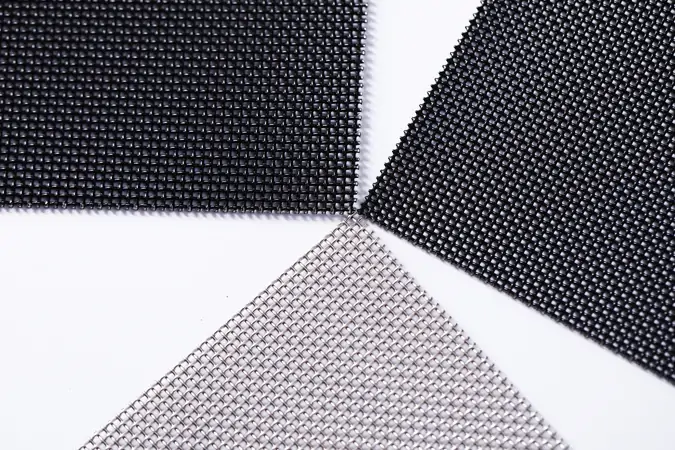Stainless steel security mesh plays a crucial role in ensuring the safety and durability of security doors and windows. Understanding the factors that affect the quality of this mesh can help you make informed decisions for your manufacturing or distribution needs. This article will explore these factors in detail, focusing on the stainless steel wire, weaving process, and surface treatment.
1. Stainless Steel Wire: The Foundation of Quality
1.1 Material of the Stainless Wire
The quality of stainless steel security mesh is primarily influenced by the type of stainless steel used. There are different grades of stainless steel, each suited to specific applications:
304 Stainless Steel: Known as 18-8 stainless steel (18% chromium and 8% nickel), 304 is a versatile and affordable option. It provides a good balance of corrosion resistance, strength, and heat resistance. This grade is ideal for indoor or low-corrosion environments.
316 Stainless Steel: This grade contains an additional 2-3% molybdenum, enhancing its resistance to corrosion, especially in saltwater environments. For coastal areas or harsh environments, 316 stainless steel is a superior choice due to its enhanced durability and resistance to rust.
1.2 Diameter of the Stainless Wire
The diameter of the stainless steel wire used in the mesh significantly impacts its safety and performance:
Common Diameters: Typically, stainless steel wires of 0.8mm and 0.9mm are used. Thicker wires, such as 1.2mm, provide increased security but are more challenging to weave.
Impact on Safety: Thicker wires contribute to a stronger and more durable mesh, making it more effective against forced entry and providing higher safety standards. Domine’s 1.2mm wire meshes are designed to offer enhanced protection.
1.3 Tensile Strength of the Stainless Wire
Tensile strength measures the maximum load a wire can handle before breaking:
Importance in Mesh Quality: Higher tensile strength ensures the mesh can withstand significant force, crucial for passing rigorous tests like the knife shear test (AS5041-2008). Superior tensile strength enhances the overall security and longevity of the mesh.
Cost Consideration: While wires with better tensile strength are more expensive, they deliver superior performance and durability. Domine’s use of high-tensile wires reflects their commitment to quality.
2. Weaving Process: Precision Matters
2.1 The Role of Weaving Machines
The weaving process is critical in determining the quality of the stainless steel mesh:
Machine Capability: Advanced weaving machines ensure that the mesh apertures are square and the surface is flat. A well-calibrated machine produces a uniform and high-quality mesh, minimizing defects.
Impact on Quality: A precise weaving process prevents issues such as inconsistent mesh openings or irregular surfaces, which can affect the overall performance of the security mesh.
2.2 Experience and Expertise
Skilled Craftsmanship: Experienced operators are essential for achieving high-quality weaving results. Their expertise ensures that the mesh meets all safety and aesthetic standards.
Investment in Technology: Regular upgrades to weaving technology and machinery contribute to improved mesh quality and efficiency.
3. Surface Treatment: Enhancing Durability
3.1 Powder Coating
Powder coating is a common surface treatment for stainless steel mesh:
Process: Powder coating involves applying a dry powder to the mesh surface, followed by baking at approximately 200°C. This process enhances the mesh’s corrosion resistance and appearance.
Quality of Powder: High-quality powders, such as those from AkzoNobel, provide excellent adhesion, ensuring that the coating remains intact and does not peel or fade over time. This contributes to the longevity and visual appeal of the mesh.
3.2 Pre-Treatment
Before powder coating, the mesh undergoes pre-treatment:
Purpose: Pre-treatment involves cleaning and preparing the mesh surface to improve powder adhesion. This step is crucial for achieving a durable and long-lasting finish.
Steps Involved: Effective pre-treatment includes removing contaminants and ensuring a clean surface to maximize the bond between the mesh and the powder coating.
4. Evaluating Mesh Quality: Key Considerations
4.1 Comparing Different Meshes
When evaluating stainless steel security mesh, consider:
Visual Inspection: Look for uniformity in mesh openings and a smooth, even surface. Inconsistencies can indicate issues in the weaving process or surface treatment.
Performance Testing: Check if the mesh meets industry standards and test it under real-world conditions. This ensures that the mesh will perform as expected in its intended application.
4.2 Cost vs. Quality
Balancing Act: Higher quality meshes often come with a higher price tag. However, investing in superior materials and manufacturing processes can result in long-term savings due to enhanced durability and reduced maintenance costs.
Value for Money: Consider the overall value offered by the mesh, including its performance, longevity, and the safety it provides. Sometimes, paying a bit more upfront can lead to better long-term results.
5. The Importance of Quality Control
5.1 In-House Quality Checks
Consistent Standards: Ensure that the manufacturer implements rigorous in-house quality control processes to monitor every stage of production, from wire selection to final coating.
Regular Audits: Conduct regular audits and tests to verify that the mesh adheres to required specifications and standards. This helps in maintaining high-quality production.
5.2 Third-Party Certifications
Industry Standards: Look for third-party certifications that indicate compliance with industry standards. Certifications can provide additional assurance of the mesh’s quality and performance.
Reputation: Choose suppliers with a strong reputation for quality and reliability. Established manufacturers often have proven track records and adhere to stringent quality control practices.
In summary, the quality of stainless steel security mesh is influenced by several critical factors, including the type and diameter of the stainless steel wire, the weaving process, and surface treatment. By understanding these factors and choosing a reputable manufacturer, you can ensure that the security mesh meets high standards of performance and durability.
Whether you are a manufacturer or distributor, investing in high-quality materials and production processes will result in better products and greater customer satisfaction.


